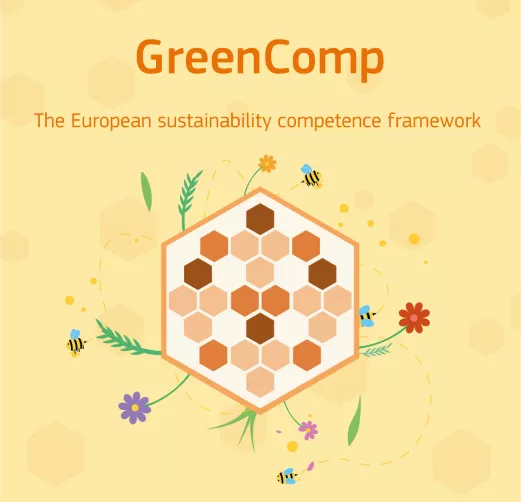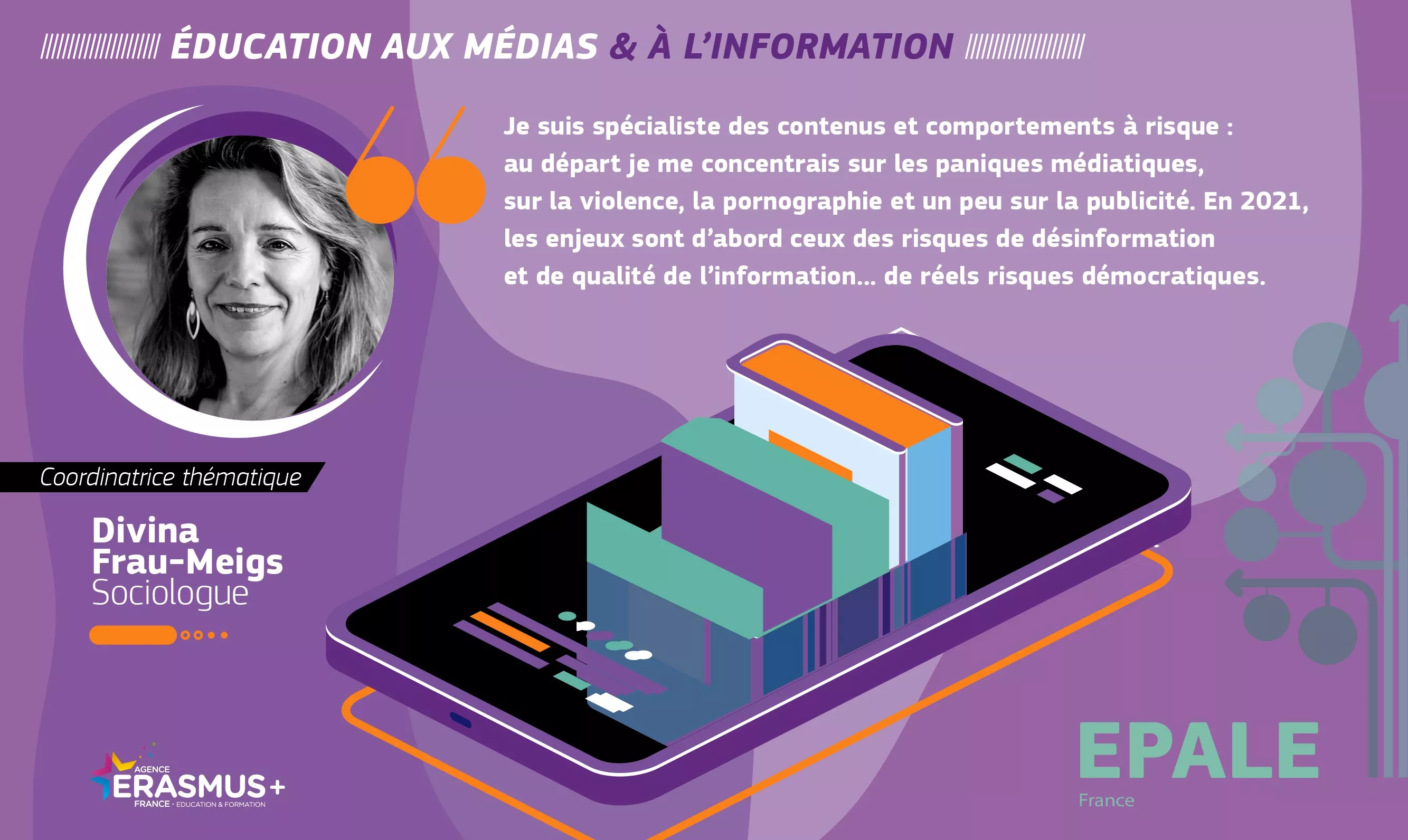Are “green skills” and “digital skills” compatible frameworks ?
Blog written by Divina Frau-Meigs and Pascale Garreau, from Savoir*Devenir

The publishing of the European reference framework of “green” competences in France is an opportunity for Savoir*Devenir to share its analysis, from the perspective of Information and Media Literacy (IML).
The European framework of competences for sustainability, “GreenComp”, was published on 14 January 2022 in English:
Green competences are part of the European New Green Deal and provide a framework for addressing environmental issues in education. This raises the question of how it fits in with Digcomp 2.2, which deals with digital competences, including Information and Media Literacy (IML). The question is all the more relevant, as the recent update of Digcomp 2.2 (March 2022) also provided an opportunity to assess this increasingly crucial aspect of IML, in connection with digital and media sobriety, both in perceptions and in environmental materiality. With a direct impact on the training of adults and young people alike!
GreenComp is a reference framework which includes 12 competences divided into 4 areas:
- Embodying sustainability values
- Embracing complexity in sustainability
- Envisioning sustainable futures
- Acting for sustainability
The GreenComp competences have been defined to “help learners develop knowledge, skills and attitudes that promote ways to think, plan and act with empathy, responsibility and care for our planet”. They have been designed to provide a basis for transformative learning, leading to real change, and have the merit of offering a common EU tool.
The GreenComp competences have been defined to “help learners develop knowledge, skills and attitudes that promote ways to think, plan and act with empathy, responsibility and care for our planet”. They have been designed to provide a basis for transformative learning, leading to real change, and have the merit of offering a common EU tool.
IML-compatible competences
Among the 12 competences established in these 4 areas, those to be focused on in IML are the ones dealing with the reduction of the environmental impact of digital uses, which has become a central theme of IML. They have the merit of including values in the competences, which IML in relation to digital citizenship has always practised, at least at Savoir*Devenir.
Area 1: Embodying sustainability values
The values highlighted in area 1 are sustainability, justice for current and future generations, and the preservation and restoration of nature.
They do not overlap with those of IML (mainly related to freedom of expression, dignity, participation, privacy, education, safety), but without expression, information and participation it would seem difficult to put them into action.
Other areas are more compatible, according to Savoir*Devenir, which offers a selection.
Area 2: Embracing complexity in sustainability
- 2.1 Systems thinking
To approach a sustainability problem from all sides; to consider time, space and context in order to understand how elements interact within and between systems.
Example of a practical application in IML and digital citizenship: using the Life Cycle concept to understand the impact of media and digital equipment and services on the environment.
- 2.2 Critical thinking
To assess information and arguments, identify assumptions, challenge the status quo, and reflect on how personal, social and cultural backgrounds influence thinking and conclusions.
Example of a practical application in IML and digital citizenship: recognising digital greenwashing and making a critical analysis of media coverage of environmental issues and the carbon footprint agenda of digital platforms.
Area 3: Envisioning sustainable futures
- 3.1 Futures literacy
To envision alternative sustainable futures by imagining and developing alternative scenarios and identifying the steps needed to achieve a preferred sustainable future.
Example of a practical application in IML and digital citizenship: adopting low-tech or information commons approaches, mastering uses aimed at more sober applications.
Area 4: Acting for sustainability
- 4.1 Political agency
To navigate the political system, identify political responsibility and accountability for unsustainable behaviour, and demand effective policies for sustainability.
Example of a practical application in IML and digital citizenship: developing a media and digital culture, including institutional and political dimensions, for all citizens.
- 4.2 Collective action
To act for change in collaboration with others.
Example of a practical application in IML and digital citizenship: encouraging a citizen and participative mobilisation in the values of respect for the environment, the fight against programmed obsolescence, the exploitation of children in rare earth mines. Giving visibility to movements like Fridays for Future, especially on social and mass media.
- 4.3 Individual initiative
To identify own potential for sustainability and to actively contribute to improving prospects for the community and the planet.
Example of a practical application in IML and digital citizenship: adopting more sober uses and modifying our modes and types of consumption in relation to computer hardware and content, both at work and at home.
Between sustainability and sobriety, taking a critical stance
Despite the three values put forward and the competences required to bring them to life, the perspective proposed by the EU and its experts, which is resolutely voluntarist, takes a neoliberal approach, based on consumption and a philosophy of exponential progress. It defines sustainability as “prioritising the needs of all life forms and the planet, by ensuring that human activity does not exceed planetary limits”.
This frame of reference obscures the thorny issue of climate change, respect of ecosystems and the concerns of finite resources, by creating a list of other critical Earth system processes, thus diluting their urgency. In its positive desire to move towards a search for solutions, though this is commendable, it smoothes over the burning controversies in the environmental field while knowledge is being developed and is progressing. It does not question the paradigms of progress and consumption, but focuses on the potential commitment of individuals, and their responsibility, with a preparation (and thus an induced acceptance) of individual voluntary measures. It includes very little on collective responsibilities and binding solutions, left mainly to the collective action of individuals, without mentioning once the competing or complementary notion of “sobriety”.
In IML, a comparison is necessary with other frames of reference, from other stakeholders, such as those of civil society. Among these reference systems, based on the questioning of real needs, are, for example, that of EarthDay.org or the Climate Fresk. They tend to focus more on “climate literacy” and ask questions about the reasons for climate scepticism, the consequences of disruption and its anthropocentric (vs. natural) origin. Other entities such as ADEME promote energy sobriety and the levers of action for communities and territories (https://agirpourlatransition.ademe.fr/collectivites/sobriete-energetique-collectivites).
In IML, the critical stance concerning the competences and the action taken for the environment is mainly based on the right questions to ask: Why innovate? In which direction should we develop? What real needs do all these services, applications and equipment meet? These are key questions to really rethinking digital consumption and questioning economic and political leaders, whose structuring behaviour in favour of the environment is by far the most effective and fastest (according to the IPCC report). They may have the merit of creating a deep and collective desire for a shared ecology to counteract the current eco-anxiety... You could use a little AIR*!
*AIR= Analyse, Interpret, React





